If you’ve caught this month’s feature on finding your shop’s No. 2, you’ve read just how impactful it can be to have an ideal copilot by your side. The teams behind Avalon Motorsports and Urban Autocare, BG Automotive, and AutoStream Car Care all took leaps of faith and invested years in building the relationships that have kept their operations growing and their futures bright.
But through the process of training David Askwith in the shop's director of operations role, Askwith as well as co-owners Doug Grills and Rick Levitan noted that they learned a valuable lesson that’s actually helped improve operations for the entire AutoStream team.
“I think some of the initial challenges we worked through along the way have been helpful in developing other folks within the organization,” says Askwith. “Now we’re much more experienced and disciplined in terms of how we communicate and how we set our expectations for the ways things will be executed.”
Grills agrees noting “There are a lot of situations in our industry where we tend to throw people into certain roles and expect them to know everything we want and I think that’s a shortcoming on our part as owners,” he says. “We weren’t taking enough personal responsibility for training people on what we do, how we do it, what our expectations are, etc.”
Through the process of clearly defining Askwith's role and the responsibilities he'd later own, the trio realized they had an opportunity to boost shop productivity and team collaboration by defining expectations and what success will look like in each role for the entire team.
“Anybody can walk in and say, ‘well here’s what I did at my last shop,’” says Grills. “The question is, what do we expect you to do at AutoStream Car Care? So we had to decide, how do we want people to answer the phones? How do we want to supply parts? How do we want to manage technicians? How do we want to set a baseline everyone can work off of?”
Once the trio had a better understanding of the systems they wanted to put in place, they took the time to clearly communicate those systems to the team at large to ensure expectations had been adequately set and the team understood how to meet them.
“Since we’ve made that intentional shift, the proof is in the pudding,” says Levitan. “We’ve been able to grow and be successful and the more we’re able to do that it becomes sort of a self fulfilling prophecy and everybody has more fun. It's our job to make sure they have the tools and the skills to be successful in doing what they do.”




